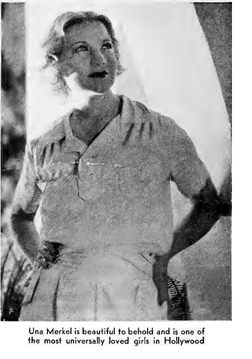This interview with Una Merkel originally appeared in the May 1935 edition of Movie Classic magazine.

disposition, keeps this charming
young player the busiest actress
in Hollywood
By ROBERT FENDER
 THERE’S a girl in Hollywood known to directors and writers as “the pulmotor girl.” Does that mean anything to you? It didn’t to me, either, until I started thinking of those things used by firemen, lifeguards and physicians known as pulmotors. They’re the emergency machines employed to bring nearly dead people back to life.
THERE’S a girl in Hollywood known to directors and writers as “the pulmotor girl.” Does that mean anything to you? It didn’t to me, either, until I started thinking of those things used by firemen, lifeguards and physicians known as pulmotors. They’re the emergency machines employed to bring nearly dead people back to life.
Just so, when writers have a nearly dead story on their hands, they write in a part for this girl. And when directors see their pictures expiring dead away, they broadcast a frantic call for this very same girl. She’ll save it if it can be saved, they cry. Get her. And get her right now!
The “her” in this case, as anyone in Hollywood will tell you, is a charming little person with blonde ringlets in her hair, a twinkle in her eyes and a great heart tucked away inside her. Her name is Una Merkel. And she’s perhaps the most universally loved girl in town. Certainly she’s the busiest.
If you saw Una in a Hollywood crowd (say at a preview), you couldn’t pick her out if your life depended upon it. But ten to one she would be the young lady on your left who, on very tip-toe was jockeying for a better position to see the movie stars pass by. For Una is the most confirmed and ardent movie fan in town. She is, to my knowledge, the only one who saves all the programs of all the shows she attends—yes, and makes tiny penciled notes on the margins about players she likes best and why.
Una is so necessary to directors and ailing pictures, I suppose, because she is the only one of her kind in town. She is no more “movie actress” than you. Her unaffected laugh, tinkly and delightful to hear, differs from the average star’s studied “abandon” as a child’s laughter differs from the wearied old man’s croak. She is youth itself, mighty good for the soul, and she’ll continue to be young no matter how many years pile up on her.
“There’s so much,” she told me in her tiny feminine dressing room at M-G-M, “to be happy for. There’s so much to laugh about. Do you see that big building next door? Well, next week I’m going to have a grand big new dressing room.”
“Moving you over there, Una?”
Una laughed. “Oh, Heavens no,” she cried. “That’s going to be for the big stars. But they’ll leave their dressing rooms here and they’re going to give me a bigger one in this building. And they’re going to let me furnish it. Just as I like!” she finished, evidently carried away in high glee.
“Don’t you want to be a big star, Una?”
Una burst out laughing. “Me a star? Do you know any more funny ones?” Then she wrinkled her cute little brow and indulged in some thinking. “But,” she began, “but—even if I could, I don’t think I would. The other night I was trying to think what I’d rather be than myself and I couldn’t think of anything. Not,” she hurried, “that I think I’m pretty good but simply that I’m—I’m so darned happy!
“I love my husband, Ronnie Burla, and he loves me. I get more pleasure out of my work than anyone in Hollywood. There’s just one thing that worries me and that is that there are so many people who don’t share my good luck. I feel so sorry for people who don’t seem to have anything. I wish there was some better way of distributing money and happiness.
